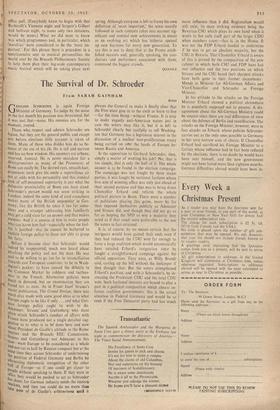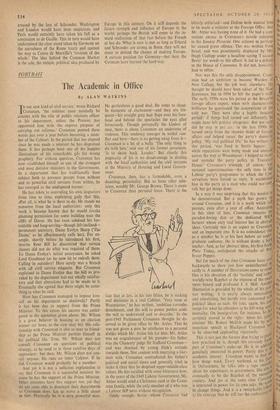The Survival of Dr. Schroeder
GAIN HAM
BONN .
GERFIARD SCHROEDER iS again Foreign Minister of Germany. To judge by the noise in the last month his position was threatened, but it was,just that—noise. His enemies are, for the moment, routed.
Those who, respect and admire Schroeder are legion, but they are the general public and except just before elections little account is taken of them. Many of those who dislike him do so be- cause of the cut of his jib. He is tall and narrow and has no bow window. His manners are urbane, reserved, ironical. He is never mistaken for a Metzgermeister as many of the Prominenz of Bonn can easily be. The shrewd eyes, smooth hair, prominent teeth give his smile a supercilious air not at odds with his personality and this ironical 11 look of self-possessed superiority is just what the defensive provinciality of Bonn can least stand. Schroeder's, person would not seem striking in London; indeed the same kind of cool casualness makes many of the British unpopular in Ger- many; like the British he takes it too far some- times and a stranger addressing him familiarly may get a cold stare for an answer and that makes enemies. And it is unwise of him to make people Who can harm him feel—especially when the feel- ing is justified—that he cannot be bothered to explain foreign policy to those not able to grasp the facts.
Before it became clear that Schroeder would indeed be reappointed, much was heard about attacking the policy and not the man. He was said to be willing to go too far in reconciliation towards east European countries; to be in Wash- ington's pocket; to have caused the &bade in the Common Market by coldness and tactless- ness to the French. Alternative policies were Much in demand, but on examination they are found not to exist. As in Franz Josef Strauss's recent, publication, The Grand Design, there was Toth play made with some good ideas as to what Europe ought to be like if only ... and what Ger- man foreign policy ought to wish to do. Adenauer, Strauss and Guttenberg who most 'rien attack Schroeder's, conduct of affairs with lance have produced not a single detailed sug- gestion as to what is to be done here and now about President de Gaulle's attitude to the Rome treaties and the Brussels EEC Commission. Strauss and Guttenberg--not Adenauer in this ease--want Europe to be considered as a whole _and not cut in half by Russian conquest but at the 'ts,attle time they accuse Schroeder of undermining :11 Position of Federal Germany and Berlin by half diplomatic recognition of the other „al of Europe—as if one could get closer to 073Ple without speaking to them. If they were in h lee they would be pushed to act as Schroeder ':s done, for German industry needs the eastern t,,.arkets, and they too could do no more than take note of de Gaulle's arbitrariness until it
pleases the General to make it finally clear that the Five must give in to the sixth or learn to live —for the time being--without France. It is easy to make vaguely anti-American noises just in case the, voters may like it, but it is left to Schroeder clearly but tactfully to tell Washing- ton that Germany has a legitimate interest in the discussion of a nuclear non-proliferation treaty being carried on over the heads of Europe be- tween Russia and America.
Is the opposition to Gerhard Schroeder, then, simply a matter of wanting his job? No, that is too simple, that is only the half of it. The whole answer is to be found in the election campaign. The campaign was not fought by three major parties, it was fought by sectional factions whose first aim of winning office was only just ahead of their second purpose and that was to bring down Chancellor Erhard and reform the whole political picture in Bonn. There were a number of politicians playing this game, more by far than exposed themselves publicly as Adenauer and Strauss did, and though they did not go so far as helping the SPD to win a majority they acted as if that result were preferable to the one the voters in fact returned.
It is, of course, by no means certain that the intriguers would have gained their ends even if they had reduced the CDU vote far enough to force a large coalition which would automatically have entailed Erhard's resignation since he fought a straightforward campaign against the official opposition. They were, as Willy Brandt said, casting up the bill without the innkeeper if they thought that. But the voters strengthened Erhard's position, and with it Schroeder's, by in- creasing the Protestant CDU and the total CDU vote. Such factional interests are bound to play a part in a political composition which almost en- forces coalition governments; this is the actual situation in Federal Germany and would be so even if the Free Democrat party had lost much more influence than it did. Regionalism would still exist, its most striking evidence being the Bavarian CSU which plays its own hand when it wants to but calls itself part of the larger CDU when numbers count—that is, in the House. It was not the FDP Erhard needed to undermine if he was to get an absolute majority, but the CSU in Bavaria. That Chancellor Erhard is aware of this is proved by the composition of the new cabinet in which both CSU and FDP have lost real influence and the two positions on which Strauss and the CSU based their sharpest attacks have both gone to their former incumbents: Mende as Minister for All-German Affairs and Vice-Chancellor and Schroeder as Foreign Minister.
In his attitude to the attacks on the Foreign Minister Erhard showed a political shrewdness he is popularly supposed not to pOssess. A dis- agreement about the All-German Ministry could be sincere since there are real differences of view about the defence of Berlin and reunification. The attacks on the Foreign Minister, however, were in fact attacks on Erhard, whose policies Schroeder carries out as the only ones possible to Germany in her very narrow area of choice. If Chancellor Erhard had sacrificed his Foreign Minister to a faction whose influence had in fact been reduced by the elections, there is no doubt he would have been next himself, and the new government might not have lasted more than eighteen months. German difficulties abroad would have been in-
creased by the loss of Schroeder. Washington and London would have been suspicious, and Paris would certainly have taken his fall as a concession to de Gaulle. This in turn would have undermined the clear stand taken by Germany on the sacredness of the Rome treaty and opened the way to Couve de Murville's 'revision of the whole.' The idea behind the Common Market is the sole, the unique, political idea produced by Europe in this century. On it still depends the future strength and influence of Europe in the world; perhaps the British will come to the in- ward realisation of that fact before the French at last do. What is sure is that as long as Erhard and Schroeder are strong in Bonn, they will not cease to defend the chance of making Europe. A curious position for Germany—but then, the Germans have learned the hard way.







































 Previous page
Previous page